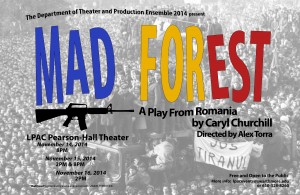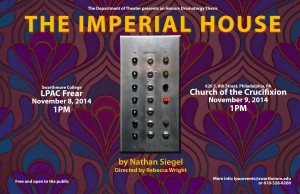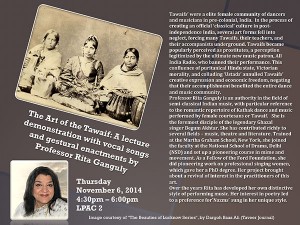 Caryl Churchill’s remarkable play, MAD FOREST takes place before and after the revolutionary events of December 1989 in Romania that marked the end of a Communist dictatorship. The title, which alludes to a Romania of the past, a Romania populated with forests and horseman warriors, simultaneously evokes the surreal nature, the euphoria, and the devastation of a revolution.. The play puts a human face on the turning point of a people and of a nation – two families under scrutiny from the secret police, one rich, one poor. Blending stark realism and uneasy fantasy, Churchill achieves a look into the belly of the revolutionary beast as the characters succumb to and rebel against the shifting realities of a world in transition.
Caryl Churchill’s remarkable play, MAD FOREST takes place before and after the revolutionary events of December 1989 in Romania that marked the end of a Communist dictatorship. The title, which alludes to a Romania of the past, a Romania populated with forests and horseman warriors, simultaneously evokes the surreal nature, the euphoria, and the devastation of a revolution.. The play puts a human face on the turning point of a people and of a nation – two families under scrutiny from the secret police, one rich, one poor. Blending stark realism and uneasy fantasy, Churchill achieves a look into the belly of the revolutionary beast as the characters succumb to and rebel against the shifting realities of a world in transition.
With a stark and simple set by Matt Saunders, costumes by Laila Swanson and lighting by James P. Murphy, and sound by Liz Atkinson, director Alex Torra takes the ensemble cast of eleven (Sarah Branch, Rex Chang, Avni Fatehpuria, Makayla Portley, Htet Win, Nina Serbedzija, Kate Wiseman, Katy Montoya, Jaime Maseda, Thomas Butler and Oliva Jorgenson) on a supple journey into the tumultuous times of the late 80s in Bucharest.
Alex Torra is a Philadelphia-based director, performer, producer, and educator. He is a Company Member with Pig Iron Theatre Company, where he has worked as a Performer in Twelfth Night, Zero Cost House, Cankerblossom, Welcome to Yuba City, Pay Up, 365 Days/365 Plays, and Anodyne; as Director of Come to my Awesome Fiesta, it’s Going to be Awesome, Okay?; and as Creative Producer for PAY UP 2013 and I Promised Myself to Live Faster. He also serves as Co-Founder and Resident Director for Team Sunshine Performance Corporation, where he has directed Punchkapow and JapanAmerica Wonderwave, and the upcoming production ofThe Sincerity Project in December at FringeArts. Alex has received fellowships from the Independence Foundation, the Philadelphia Live Arts Brewery, the Princess Grace Foundation, Oregon Shakespeare Festival, and NY’s Drama League, and last year was a finalist for the F. Otto Haas Award for an Emerging Philadelphia Theatre Artist. He received his B.A. from the University of Pennsylvania and his M.F.A. in Directing from Brown University.
LPAC Pearson-Hall Theater (Mainstage)
November 14, 2014 – 8PM
November 15, 2014 – 2PM & 8PM
November 16, 2014 – 2PM
“Mad Forest” is presented by special arrangement with SAMUEL FRENCH, INC.
For more information about these and other events in the Theater Department contact lpacevents@swarthmore.edu or call 610-328-8260.
https://www.facebook.com/events/314715605379534/








